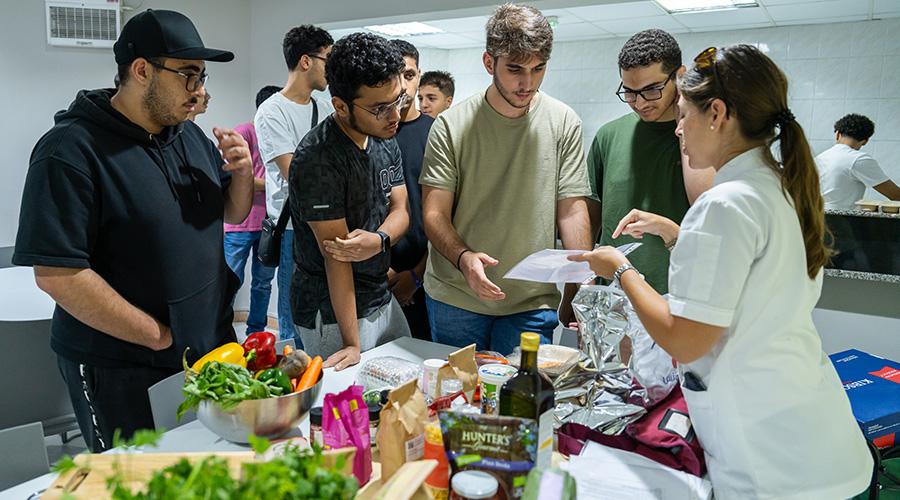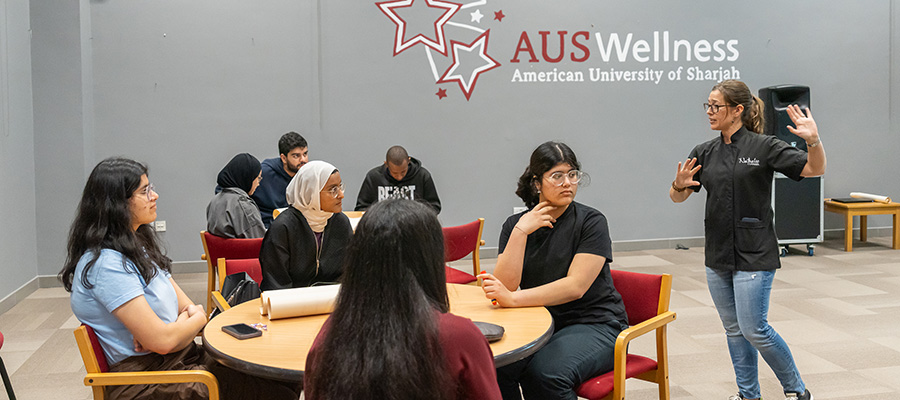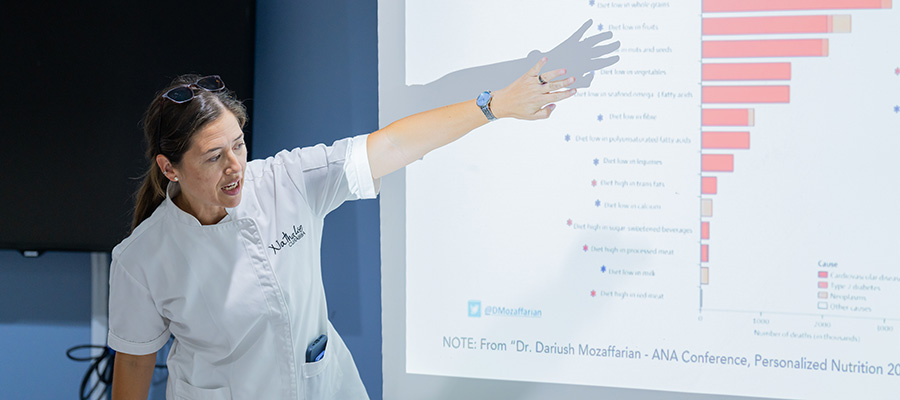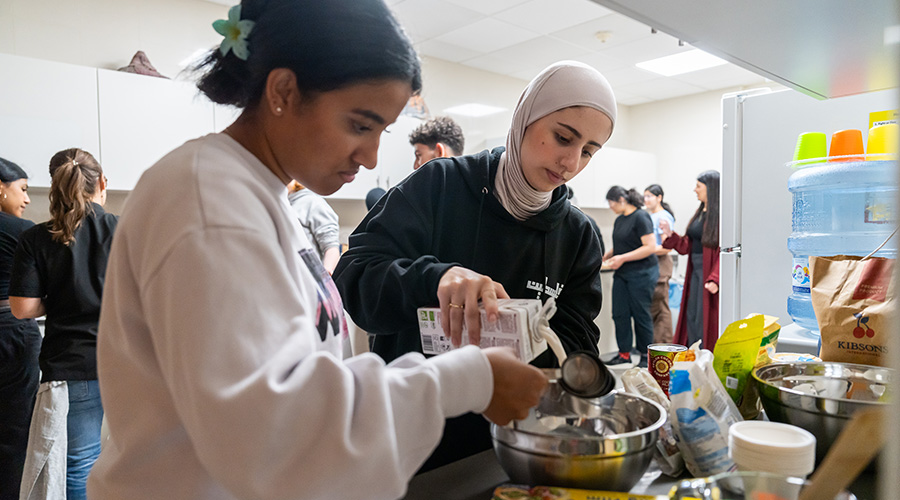- About
- Admissions
- Study at AUS
- Prospective Students
- Bachelor's Degrees
- Master's Degrees
- Doctoral Degrees
- Admission Publications
- International Students
- Contact Admissions
- Grants and Scholarships
- Sponsorship Liaison Services
- Testing Center
- New Undergraduate Student Guide
- Undergraduate Orientation
- New Graduate Student Guide
- Graduate Orientation
- File Completion
- Payment Guide
- Students with Disabilities
- Executive and Continuing Education
- Academics
- Life at AUS
- Research
- Contact Us
- Apply Now
- .

Inside the Green Living Challenge: How AUS students transformed their residential halls into sustainability hubs
On a warm spring evening in the AUS residential halls, students gathered for a Green Iftar. The event brought the community together to celebrate the holy month, while raising awareness about the importance of reducing food and plastic waste. Reusable dishes replaced disposables, leftovers were shared or stored and conversations centered on mindful choices. It was just one example of how students have been weaving sustainability into their daily routines.
That Iftar was just one of many events organized under the banner of the Green Living Challenge. Over the course of the academic year, the challenge has helped make sustainable living more attainable for students on campus. From teaching students about sustainable dietary choices to encouraging green modes of transportation, the initiative has helped create lasting changes in how residents think about energy, waste and community.
The campaign started with the creation of the Green Living Guide by the Office of Sustainability. The EcoReps, a group of students who work with the sustainability team, were inspired by the guide and proposed ideas to bring it to life in the residence halls. One idea led to another and eventually, they partnered with the Student Residential Life Department.

“We wanted something that was fun, practical and meaningful,” said Sathya Aamuktha Samrajyam, an EcoRep and member of the Residential Hall Engagement Team who helped lead the initiative.
Sathya worked closely alongside Syed, another student who is also an EcoRep and a Residential Assistant. They worked together to coordinate the initiative and acted as advocates, motivators and role models for others throughout the year.
They envisioned what it might look like if resident students were to truly integrate sustainability into the spaces they call home and carefully designed the various initiatives to align with the United Nations’ Sustainable Development Goals. Notably, SDG 11 (Sustainable Cities and Communities) and SDG 12 (Responsible Consumption and Production), to ensure each challenge had both a direction and purpose.
“Sustainability doesn’t have to be complicated,” notes Samrajyam. “Sometimes it starts with turning off a light, rethinking a meal or choosing to reuse instead of throw away. People often underestimate the impact of their own actions. It might seem cliché, but if we all do these things, we really can change the world—and I believe, given the state of our planet, we have a duty to.”
The team also devised a gamified point system, rewarding students for actions like conserving electricity, minimizing plastic use, attending workshops and participating in awareness events. Throughout the campaign, the Green Living Guide served as a practical resource students could easily consult for ideas on how to live more sustainably.

Activities like Let the Guide Guide You encouraged students to approach moving in or out with sustainability in mind. Survey on the Go introduced smart travel choices through an awareness-based survey, and SustainaBites challenged students to adopt more sustainable—and healthier—dietary habits.
The challenge also gave AUS’ EcoReps a chance to lead. They worked seamlessly together to plan events and gather feedback. They also collaborated closely with AUS departments and external partners such as the Emirates Environmental Group, gaining practical experience in event planning, community engagement, data analysis and advocacy along the way.
"I really enjoyed taking part in the Green Living Challenge. I learnt a lot more about how to travel sustainably, about how the smallest changes can slowly lead to a greener and better life. I was lucky enough to win one of the challenges and got an electric scooter! I love this initiative taken by the Office of Sustainability, and I hope this challenge continues!" said Yohannes, a student residing in the men’s halls.
To ensure impact beyond the residential halls, the EcoReps also ran social media campaigns, hosted community events like a Can Collection Drive and used QR-based surveys to gather input. These efforts made sustainability feel more approachable and interactive, and helped resident students and supporters across campus feel like their voices and ideas were being heard.

All the initiatives built towards the Most Sustainable Hall of the Year award, a new addition to the AUS calendar created by the Office of Student Experience to support the Green Living Challenge. For Spring 2025, the title went to GH Women’s Halls, who stood out for their consistent participation and creative contributions. While the award was based on points earned through the Green Living Challenge, the goal went beyond winning—it aimed to demonstrate the impact of working together to build lasting change.
Since the challenge, many residents have reported carrying their new habits beyond the residential halls—bringing reusable containers to campus cafés or reminding friends to switch off unused lights.
After the awards took place, the Green Living Guide made its way into the residence hall curriculum, and has helped to integrate sustainability into the daily rhythm of student life.
In the coming academic year, the new cohort of EcoReps will work closely with the RAs and the Student Residential Life team to expand the Green Living Challenge, making it more fun, engaging and impactful across the residence halls and involving even more members across the AUS campus.
“Sustainability is a journey,” said Samrajyam. “We’re learning alongside our peers, and each small step makes a big difference. We’re just getting started.”

Photo caption: AUS EcoReps pose for a picture on campus earlier this year.

